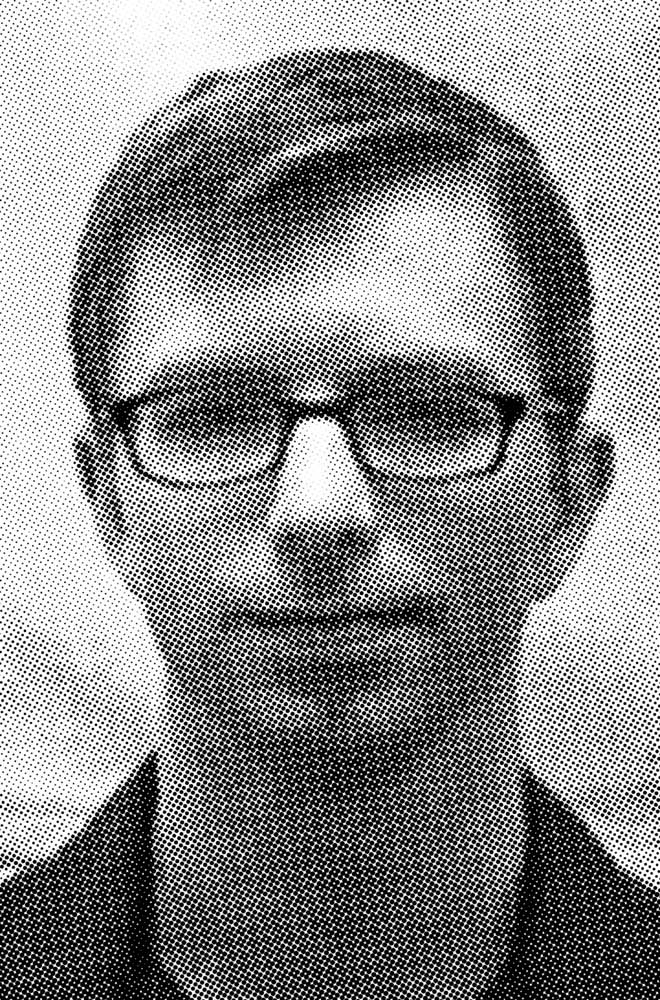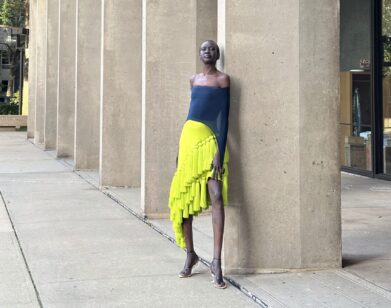Chelsea Manning
I think the embryonic digital world had the same affect on me as the openness of the old American frontier . . . It allowed me to transcend the physical differences. CHELSEA MANNING
In late 2009 and early 2010, a 22-year-old Private First Class and Army intelligence analyst named Bradley Manning downloaded a mass of classified and confidential files, some to a CD marked “Lady Gaga,” and passed them to the online media outlet WikiLeaks. For many, the digital dump of this material, much of which came to be known as the Afghan and Iraq “War Logs”—and which included video of an American helicopter attack on a group unarmed civilians—was the righteous act of a whistle-blower seeking greater transparency of our military’s conduct. Some have even credited Manning’s leak of diplomatic cables with inspiring the progressive uprisings of the Arab Spring, which began shortly thereafter. In 2011, however, the Army charged Manning with, among other things, “aiding the enemy,” a crime akin to treason and potentially punishable by death (and for which she was ultimately found not guilty). For much of that year, Manning had been held in what amounted to solitary confinement—so as to prevent self-harm, it was claimed—in a military brig in Quantico, Virginia. And, on August 21, 2013, Manning was sentenced to 35 years in prison and sent to the United States Disciplinary Barracks at Fort Leavenworth, Kansas.
In an announcement made the day after sentencing, Manning came out as transgender, declaring her intent to begin living openly as a woman. The next year, she successfully petitioned to have her name legally changed to Chelsea Elizabeth Manning and, in February 2015, was allowed to begin hormone therapy. Since that time, Manning has written a column for The Guardian‘s U.S. website, recounting the many threats made against her during her more than five years in prison (that she would be sent away to be tortured at a black site or disappeared in Guantanamo, for starters), reflecting on her most dire moments, contemplating castration and suicide, and her hope for a sisterhood beyond bars with which she can claim communion, and to which she can give strength.
Growing up, Manning was bounced around, from Oklahoma to Wales and back, cared for as often by her sister, Casey, 11 years her senior, as by her parents—both of whom Casey has characterized as alcoholics. In Leavenworth, Manning, now 28, has access to psychotherapy sessions, radio, and cosmetics, but is strictly limited in access to visitors and cannot go on the internet. She cannot be photographed, interviewed on camera, or speak with journalists in person or on the phone, but can communicate by post. So, in January, I wrote her to tell her about our special April issue celebrating the pathfinders and conscientious among us who are creating new spaces for themselves and for others, and asked her to be a part of it. She very kindly accepted. Here is our correspondence.
CHRIS WALLACE: First of all, how are you? Is there anything that I—or anyone—can or ought to be doing for you?
CHELSEA MANNING: Thank you. I am pushing myself through at the moment. I have a lot on my plate currently: I’m waiting for the judge’s ruling in my lawsuit challenging the military prison’s hair-length restrictions; I’m still in the process of challenging what I believe to be an unlawful and discriminatory disciplinary board from last year; I’ve challenged the Department of Justice and FBI to release the investigative records related to my case; and, most importantly, I’m only weeks away from filing the brief in my court-martial appeal. It’s an exhausting schedule. As for you and anyone else, I can only ask of those who care about me and the issues in my case to support me and spread the word about what is going on. Donations to my legal defense fund really help, and I think keeping me motivated and spreading the message are also very important.
WALLACE: You wrote recently about how tough the holidays were. How is your day-to-day life? Are there things you particularly look forward to, dread, or are surprised by?
MANNING: Day-to-day life is as simple as it is routine—though my days are often long and very busy. On weekdays, I wake up at about 4:30 each morning. I get dressed, have a cup of coffee, and go to the prison cafeteria for breakfast. Not long after dawn, we show up for work at our day jobs. I work at the prison wood shop. Any legal or medical appointments are scheduled during the workday, too. We have about an hour and a half break for lunch, which is when I make a lot of my phone calls. The workday ends around 4 p.m. When I get back to my cell, I usually have a stack of mail and laundry at the front of the cell. For about an hour, I sort and neatly fold my laundry and read my mail. On a normal day, this includes dozens of cards and letters from supporters, a newspaper, and a handful of magazine subscriptions. Before the evening starts, I eat dinner. The rest of the day is filled with recreation. This includes the library, where I type up legal papers, letters, and assignments for college correspondence courses. I also like to run and do HIIT-style exercises during gym and outside recreation hours—but I recently took a break for a few months because of the hormone treatments. I have only just started doing these routines again in the past couple weeks. There are very few distinctions between el bueno and el malo en la prisión militar. Instead of the good and the bad, there is the boring and la repetición—the repetitive. The routine is as endless as it is numbing. It’s like Groundhog Day [1993], except that I am getting older.
WALLACE: What is your rapport like with other inmates and officers or wardens? Has it changed in the time since you’ve been there? Have provisions and accommodations changed to better suit you since you began transitioning?
MANNING: I don’t have any issues with the inmates or the guard force here at the prison. Initially, I didn’t have any problems with the senior staff, but that started to change last summer. Lately, I’m under a lot of scrutiny every day by those here that run the prison but don’t actually walk inside except on rare occasions. It seems as though they press the junior staff to focus their attention on me-and not in good ways. It is very exhausting. For the transition, I am being provided cosmetics, female undergarments, and a stable hormone treatment. I am still cutting my hair to a two-inch male restriction imposed by the prison, which I am fighting. I only want to have carefully groomed shoulder length hair meeting the standard of other female military prisoners. Yet, even the accommodations I have now were only provided after a year and a half of fighting. So I remain hopeful.
WALLACE: Are you able to sense how things on the outside have changed for the trans community in, say, the past five years? Are you hearing enough from people on the outside to be able to gauge that?
MANNING: Unfortunately, I don’t sense that things have really changed for the trans community in the last five years. Sure, we are certainly much more visible than we were only a few years ago. Media outlets are more frequently using the correct names, titles, and pronouns for trans folks as well. Yet visibility is not equality. We are still in very, very bad shape. There are still many homeless trans folk wandering the streets. They are still harassed on the street by bystanders and police officers. We still face many administrative hurdles in every aspect of our lives. If anything, things are actually getting harder for us, because now there are people who are using our visibility as an excuse to say that we are already receiving fair and honest treatment, when the reality is that we are still in bad shape as a community.
WALLACE: How much do you think about perceptions of you personally? How would you like to be thought of, understood, perceived?
MANNING: You know, I really don’t care how I am perceived by people on the outside. I am aware of—and endlessly grateful for—the support that I get through all of their letters, cards, statements of support, and petitions. Yet, none of this means that I want to be perceived in any particular way. Even if I didn’t have the support that I have, I would still be fighting the same fights, and I would still be the same person that I am today.
WALLACE: What changes do you most notice about the world, about reporting, warfare, and intelligence in the time since your trial?
MANNING: The press and free speech landscape has totally changed. There is far less news reporting today. Instead, we have this endless stream of—largely meaningless and speculative—analysis by sideline commentators and self-proclaimed “experts.” This is because investigative journalism and reporting has become much more dangerous. This is especially true for journalists and sources in National Security—but it has been getting pretty bad for beat reporters and small outlets doing local reporting, too. Beyond the obvious crackdown on leaks under the current U.S. Administration, there has also been the passing of so-called “Ag-gag” laws in states, and the increasingly looming threat of civil litigation by large corporations following the lawsuit over ABC’s 1992 report on Food Lion that have also made it harder for reporters to do their jobs. Disturbingly, the First Amendment, along with the Fourth Amendment—protecting against unreasonable searches and seizures, and requiring warrants—have been the major casualties of the shift in government policy in the last two decades. Unfortunately, I think that the biggest consequences of this tragedy won’t be clear until it is far, far too late. I think that the next two generations of Americans will be grappling with the very real specter of finding themselves living in a new and bizarre kind of digital totalitarian state—one that looks and feels democratic on the surface, but has a fierce undercurrent of fear and technologically enforced fascism any time you step out of line. I really hope this isn’t the case, but it looks really bad right now, doesn’t it?
WALLACE: What are your greatest comforts? Are there any particular books, letters, etcetera, that have been great buoys for you recently?
MANNING: Absolutely! On my birthday, there was a campaign online to send me thousands of postcards. This really gave me a boost during the toughest time of the year—the holidays. Among these, I received about a hundred or so cards and letters from my trans siblings out there, including trans kids. I was moved when I read their amazing words. It is amazing to feel such a powerful and tangible connection with other trans folks out there—they’re just so gentle and genuine.
WALLACE: Are you still a fan of Lady Gaga? Are you able to listen to music, hers or otherwise? Or to watch movies or TV?
MANNING: I am. I have a very small plastic radio that only plays whatever’s on the radio in Kansas City and in Lawrence, Kansas. So, I can listen to pop music. I also watch TV on occasion—but nowhere near as frequently as I listen to the radio. I’m also a huge fan of other pop icons today, not just Lady Gaga. I’ve been a fan of Taylor Swift for years—ever since I heard her song “Love Story.” I’m also a really big fan of Selena Gomez—I really started listening to her a lot in the months before and during my court martial in 2013. It might sound absolutely insane to folks out there, but I can safely say that Selena kept me motivated through the toughest portions of the trial. Most of all, I absolutely love Adele! Her music is so overwhelming and relatable. I was so excited to hear “Hello” on the radio that I stopped what I was doing and sat down to listen. It made me very emotional. I really enjoyed the Saturday Night Live spoof of the video, too. I’m also still a huge fan of EDM. I listen to a lot of the popular stuff—Calvin Harris, the Chainsmokers, et cetera—for hours on Saturday nights.
WALLACE: You have criticized Caitlyn Jenner as “the grinch who stole (& sold out) the trans movement.” How do you think she is misrepresenting trans people?
MANNING: Well, first I would like to point out that Caitlyn Jenner is not just a person—she is an institution. She has been surrounded by public relations experts who are carefully crafting and controlling the aspects of her public transition. When she—sort of, since she really danced around the subject—came out as trans in her interview with Diane Sawyer, I wanted to give her a chance. Unfortunately, as it became clear through the last year, it hasn’t been natural for her. She just isn’t up to the task of speaking on these issues. She does not understand, or even try to understand, the trans community as a whole. This is the most disturbing and, frankly, sad aspect of the entire affair. The PR folks are trying to rein in her messaging, but she, as a person, just isn’t up to the task. She can’t even fake it. I have heard—both directly and indirectly—from other trans women, just how tone deaf and distant Ms. Jenner has been with them in their interactions with her last year. But her major public blunders—not quote “getting” marriage equality and worrying about trans women not looking like a “man in a dress”—should make it clear to those who didn’t interact with her personally that she simply has the wrong mind—set to be a spokesperson.
WALLACE: I have heard it said that her transition was “easy.” I cannot imagine a single thing about your transition—at any stage—that could be called easy.
MANNING: I do not think that Caitlyn Jenner’s transition was easy. Coming out and transitioning as a public figure—even for someone like her—is an extraordinarily difficult task to undertake. I might not agree with her on a couple of points, but I will refuse to say that her transition was easy. There is far more to transitioning in the public eye than money, public relations, and logistics. Fundamentally, it is a very real, very difficult emotional roller-coaster. I do not care whether or not you would be considered a hardened celebrity or public personality—you will have sleepless nights, you will have doubts, your mind will go to dark places. Anxiety, depression, and suicide don’t discriminate based on how much money you have—though it might make it easier for you to get help. I think that it will be much easier for the next famous trans person to come out. I predict that such a person is very likely in the process of preparing to come out in transition publicly right now. I think this person is likely a famous actor who will come out as a trans woman in the next year or two. By that time, it will absolutely be a lot easier to transition than it was in 2013 or 2015. I guess we will see how it plays out when it happens. I support the next person fully, and I wish them nothing but the best of luck in their endeavors.
WALLACE: Do you find that you are able to comfort and give strength to others with your story? What, in turn, brings you solace and strength? Were there people who were particularly helpful to you along the way?
MANNING: The most important people for me, at least in the last couple of years since I came out, are my supersecret trans friends and confidantes. I think I need to come up with a code name for this circle. One of them in particular has been my lifeline during really tough moments—like during a rough period of anxiety and depression in May and June of 2015, about three to four months into my hormone treatment. I cried and cried over the phone, and yet these people were there for me when I was at my most vulnerable. It certainly made my struggle a lot easier. I have found hundreds, if not thousands of people who have written to me, or have spoken through people that I know, about the comfort and strength that they have gotten from my story. I must admit: It’s a little overwhelming! I immediately relate to all of them, though—which gives me a lot of strength and energy. I think it’s actually kind of sweet how there is a reciprocal effect that our stories can have on each other. They inspire me far more than they realize.
WALLACE: Can you tell me a little bit about your life before the Army? What were you into as a kid? In moving from one place to another, to Wales, back to Oklahoma, et cetera, did you have things that kept you tethered, inspired you?
MANNING: As a young kid, I spent a lot of time exploring the world around me. I lived a few miles outside of a tiny town in central Oklahoma. I would often run amok though the fields of wheat, the patches of trees, along the railroad tracks, and on red dirt roads. This had a profound effect on my view of the world—vast, open-ended, full of opportunity, and ready for exploration. I also had regular access to a computer, which was rare for kids in the early and mid-1990s. I think the embryonic digital world had the same affect on me as the openness of the old American frontier. While being tossed around the world from place to place as a teenager, I wasn’t really tethered to any place or anyone. I think the increased ubiquity of the internet and networked computing in general allowed me to have some tether no matter where I was geographically. I could log in to a computer from anywhere in the world and access the same information and the same people. It allowed me to transcend the physical differences. I didn’t really have anyone in particular who inspired me or that I found fascinating as a kid. It wasn’t until I was in my early twenties that I began to find people—and they were all historic figures—that I began to relate to and find some inspiration in. Today, there are a lot of pioneers in science and civil rights that I admire—people like Richard Feynman, Carl Sagan, Malcolm X, and Harvey Milk. This might strike some people as odd, but I feel a connection to them nonetheless.
WALLACE: From your Guardian columns, it seems to me that you have really embraced your position as a leader in advocacy for transparency as well as for inclusiveness and rights for trans people. Are you able to communicate with peers in other movements? Do you feel as though you are a leader, a touchstone, a pioneer to any causes? Do you have any specific ambitions or goals—levels of awareness or concrete legislation—that you’d like to see us achieve in the next five years?
MANNING: You know, I don’t think that I’m embracing any kind of leadership for transparency or trans advocacy. It’s not my goal to be a leader or spokesperson, or anything like that. I’ve certainly been given the opportunity to speak out on these issues and a few others. I am really passionate about transparency and trans rights issues, so I embrace these opportunities to speak. I try to stay in touch with those who are prominent in both the trans and transparency movements, but more often than not, I am speaking out on a particular issue on my own. I certainly hope that people listen to me and think about these issues. But regardless of whether I had a public venue to speak in, I would still be passionate about them. On a transparency front, I would say that I certainly dream of a world in which our local, state, and national and international governments and other organizations have a 21st century, digital-era transparency built into them by default. If an organization produces a document, it should be made public as soon as possible. I don’t believe that Freedom of Information laws, which have arbitrary time periods or broad blanket exemptions, meet the level of transparency that society needs today. There are just too many opportunities—and an increasing number of them—to hide systemic, institutional wrongdoing behind legal veils, legal theories, and arbitrary exemptions. I hope that we can start to chip away at this, but it sure looks like society is still sliding in the opposite direction. As for trans issues, I believe that the trans movement is at a crossroads. We have achieved an unprecedented level of visibility in the last couple of years. However, as I said, that’s not the same thing as equality. There is an awful lot of work to do to protect trans folks. We are still disproportionally poor and administratively and institutionally discriminated against at all levels of society. I think we can achieve meaningful change, but only if we demand that the institutions themselves change their behavior. I think that some of today’s focus on freedom of information and trans rights have a tendency to focus on the actions of individuals and how they should be regulated by governments. However, I think it’s important to remember that it is the institutions themselves—schools, tax collection services, banks, human resources decisions, health departments, police departments, prosecutors, courts, and prisons—where the most devastating and systemic problems occur today. The scale of these problems is simply unimaginable. That is why it can be so difficult to get people to think about systemic institutional problems. It is easier just to see the actions of one or two people and say, “That’s wrong!”
CHRIS WALLACE IS INTERVIEW‘S SENIOR EDITOR.







